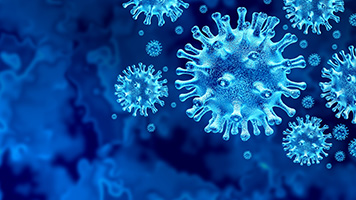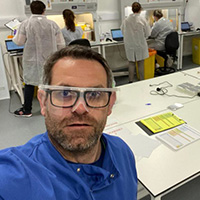‘There are now some infections that we simply don’t have any treatments for, and more are coming,’ says Professor Alan McNally
What comes next after COVID-19? Scientists have warned that outbreaks of other diseases are inevitable.
 COVID-19 proved that the world was even less prepared for a pandemic that we had feared. We didn’t know how it spread, how to treat it or what the long-term effects could be – can we get ready for the next time? And with many diseases becoming resistant to antibiotics, infections that many people currently see as a nuisance could become deadly again. We need to find ways to use antibiotics as little as possible, while developing smart new ways to stop infections taking hold in the body.
COVID-19 proved that the world was even less prepared for a pandemic that we had feared. We didn’t know how it spread, how to treat it or what the long-term effects could be – can we get ready for the next time? And with many diseases becoming resistant to antibiotics, infections that many people currently see as a nuisance could become deadly again. We need to find ways to use antibiotics as little as possible, while developing smart new ways to stop infections taking hold in the body.
You could help us identify and treat new diseases faster, plus make our antibiotics last longer
Researchers at Birmingham are tackling infectious diseases in three ways:
- Identifying new diseases faster: this means we can help prevent their spread, spot new mutations and create specific treatments, so we are not using antibiotics where they might not even help
- Getting our gut bacteria working for us: the friendly bacteria in our gut can help protect us against the bacteria that cause disease. What if we could go beyond probiotics, transplanting some of the best bacteria to those who are more vulnerable? As well as protecting us against infectious diseases, they could even help with conditions including cancer, mental health and dementia.
- Figure out what the other 90% of human microbes do: now we know the microbes in our gut can do so much for us, how might good bacteria throughout the body help protect us from diseases?

Researchers like Josh could make a huge difference
As a PhD student, Josh Quick developed a mini-lab small enough to put in hold luggage when he flew to Guinea to help with an outbreak of Ebola. He could identify which strain people had in 48 hours instead of months. The mini-lab could help rapidly identify the outbreak of a new disease and identify new strains, which might have different symptoms or need different treatment.
 Professor Alan McNally needs your support
Professor Alan McNally needs your support
Alan was key to setting up the UK’s large-scale testing labs when COVID-19 first hit. He says: ‘Diseases that are resistant to antibiotics may be the next pandemic-level health crisis. There are no new antibiotics in the pipeline for the next 30 years, so we need to protect what we have and help the body protect us against getting these diseases in the first place.’
Make a donation
Support our global health work, including tackling infectious diseases, improving surgery around the world, better maternal health care and treating cancer, through a gift starting at £5 a month, or get in touch about making a larger gift.
RAZOR VIEW ERROR
The control '' has raised the following error:
Cannot perform runtime binding on a null reference